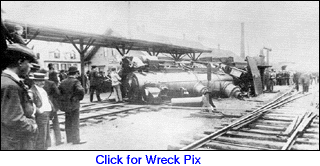| The Railroad Through the Farm |
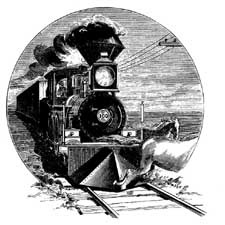 SEACOAST POETRY
SEACOAST POETRY
The passenger train is back in Seacoast, New Hampshire after disappearing for decades. Severed from passenger service in the middle of the 20th century, the region is coming to terms with 85 miles per hour commuting again? And how did NH farmers feel about the coming of the early railroads that cut through family farms. Sam Foss rails against the railway.
Railing Against the Railroad
Today the railroad reminds us of life in the 19th century. But back then, the arrival of the "iron horse" was greeted with considerable consternation and a nostalgic longing for a simpler era that would never return. The following poem by Sam Foss shows one New Hampshire farmer in a fruitless stand-off against the mighty locomotive crossing his land.
Another NH poem by journalist and historian Charles Brewster, offers the comfort that no powerful force can overcome the combined will of a united attack - in this case, an army of puny snowflakes. Whether the black/white imagery shows a hint of Civil War racial attitudes, though clearly not a primary theme here, is left to the interpretation of the reader. What we see clearly, is both a sense of awe and a sense of helplessness in the face of the powerful railroad industry.
SeacoastNH.com has paired these two local poems together, perhaps for the first time in history, and for the reader's prurient interest, we've added photos of two famous Portsmouth train wrecks. -- JDR
ALSO by poet Sam Foss: The Coming War
The Railroad Through the Farm
By Sam Foss
There's thet black abomernation, thet big locomotive there,
Its smoke-tail like a pirut flag, a-wavin' through the air;
An' I mus' set, twelve times a day, an' never raise my arm,
An' see thet gret black monster go a-snortin' through my farm.
My father's farm, my grandsir's farm, - I come of Pilgrim stock -
My great-great-great-grandsir's farm, way back to Plymouth Rock;
Way back in the sixteen hundreds it was in our family name,
An' no man dared to trespass till that tootin' railroad came.
I sez, "You can't go through this farm, you hear it flat an' plain!"
An' then they blabbed about the right of "eminunt domain."
"Who's Eminunt Domain?" sez I, "I want you folks to see
Thet on this farm there ain't no man so eminunt ez me."
An' w'en their gangs began to dig I went out with a gun,
An' they rushed me off to prison till their wretched work wuz done.
"If I can't purtect my farm," sez I, "w'y, then, it's my idee
You'd better shet off callin' this 'the country of the free.'"
There, there, ye hear it toot agin an' break the peaceful calm.
I tell ye, you black monster, you've no business on my farm!
An' men ride by in stovepipe hats, an' women loll in silk,
An' lookin' in my barnyard, say, "See thet ol' codger milk!"
Git off my farm, you stuck-up doods, who set in there an' grin,
I own this farm, railroad an' all, an' I will fence it in!
Ding-ding, toot-toot, you black ol' fiend, you'll find w'en you come back,
An ol' rail fence, without no bars, built straight across the track.
An' then you stuck-up doods inside, you Pullman upper crust,
Will know this codger'll hold his farm an' let the railroad bust.
You'll find this railroad all fenced in-t'won't do no good to talk-
If you want to git to Boston, w'y jest take yer laigs an' walk.
Sam Foss, Unlikely Radical
Notes by Steven Fowle
Reprinted by permission from The NH Gazette
Sam Walter Foss, a Candia, NH native who attended high school in Portsmouth, NH is best remembered for his poem, "The House by the Side of the Road."
In Foss's time, the late 19th and early 20th century, he was one of the country's most popular poets. He was widely published in newspapers, where he got his start. Towards the end of his career his poetry readings and lectures were quite successful in the midwest. Foss was, one surmises from reading his obituary, as peaceable and good-natured a man as any who ever lived. His work was avuncular and bucolic, neither angry nor political.
In "The Railroad Through the Farm," an old yankee dairy farmer resists the railroad's taking of his land for a right-of-way, but to no avail. He then threatens track-laying workmen with a gun, and is hauled off his farm and thrown in prison. Released, he returns to the farm, vowing to erect an impassible barrier across the path of the 'black abomernation," an act sure to result in bloodshed and tragedy.
CONTINUE to see Seacoast TRAIN WRECK pictures
Famous Seacoast NH Train Wrecks
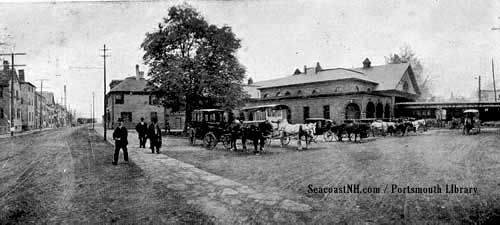
The B&M Railway station in Portsmouth was once the end of the line for passengers coming from Boston. Today the site is a pizza parlor, but the tracks remain and there is talk of a revival of passenger trains here. See the next two photos for crashes at this location. (From an old postcard courtesy Portsmouth Public Library)
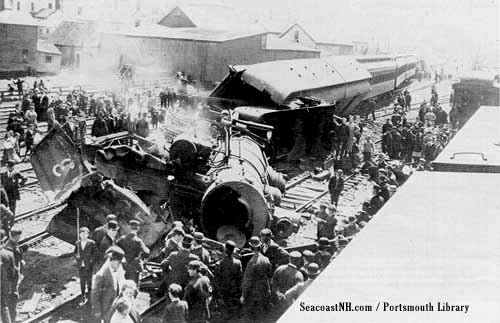
A crash at the Portsmouth station made headlines in May 1909 when one B&M passenger rear-ended another at noon. Seven people were injured and fireman on the yard engine was killed. (Courtesy Portsmouth Public Library)
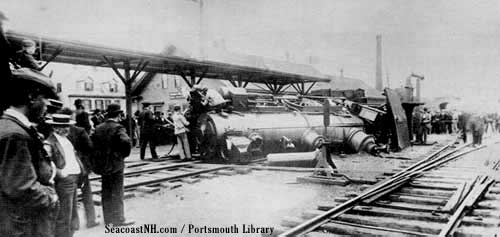
This crash knocked the engine directly onto its side in Portsmouth Station on August 12, 1894. (Portsmouth Library)

